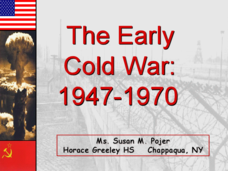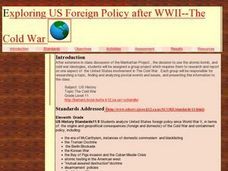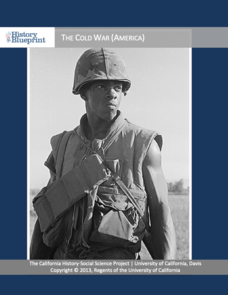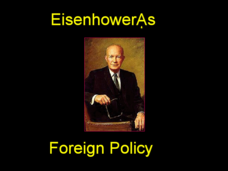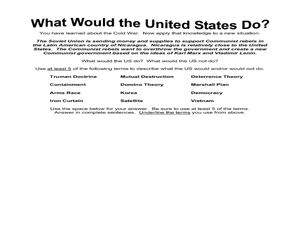University of California
Roots of the Cold War
When and how did the Cold War begin? To answer this question, you will not find a better-organized, in-depth, activity- and inquiry-based resource than this! Executing best teaching practices throughout, each portion of this inquiry...
Student Handouts
The Cold War: The Truman Doctrine of 1947
What was the Truman administration's position on foreign policy during the Cold War? Class members respond to an excerpt from President Harry S. Truman's "Truman Doctrine" with three questions in the space provided.
Curated OER
The Early Cold War: 1947-1970
With a combination of images, maps, and valuable information, this presentation is a strong resource for a history class that is coming out of a WWII unit and into a Cold War unit. Some points are outlined for students, while others are...
Curated OER
Exploring US Foreign Policy after WWII--The Cold War
Scholars explore U.S. Foreign Policy and Cold War ideologies adopted after WWII. They conduct Internet research on a topic or issue related to the Cold War Era, watch two films, and compose a time line and a multimedia presentation to...
University of California
The Cold War (America)
The Cold War—with its roots in World War II—impacts the world today. Using an extensive curriculum, scholars consider its impact through primary sources, including speeches and propaganda, as well as other skills-enhancing activities. An...
Curated OER
Restructuring the Post War World: 1945-Present
You have just entered the Cold War Zone, with 96 slides at your disposal. From changes in government in China, The Marshall Plan, and the Iron Curtain, to the Vietnam War and Ronald Regan, this presentation will help you cover it all. A...
Curated OER
The Cold War: 1945-1991
The best part of this presentation about the Cold War is the various pictures, photos, and maps throughout the slides. The timeline of this time period is difficult to follow in the presentation, as well as the details about several main...
DocsTeach
Containment in Korea: Entering the Korean War
An interesting resource explores President Truman's decision to enter into the Korean War to contain the spread of communism. Historians analyze the document using an online worksheet before participating in group discussion on the...
Stanford University
Cold War in Guatemala
Students investigate the Cold War and why it was fought in Guatemala. In this Cold War lesson, students analyze documents from the CIA and textbooks then discuss. Students work in pairs to answer questions and fill out graphic organizers.
Curated OER
Cold War
Eleventh graders analyze U.S. foreign policy since World War II, tracing origins and geopolitical consequences (foreign and domestic) of the Cold War and containment policy.
Curated OER
Cold War
In this Social Studies worksheet, students find the words related to the study of the Cold War and the answers are accessed with the button at the bottom of the page.
Curated OER
Cold War Chronology
In this Cold War worksheet, students examine the chronological list of important events between 1945 and 1991. Students then respond to 7 short answer questions based on the chronology.
Curated OER
Cold War
In this online interactive world history worksheet, students answer 21 matching questions regarding the Cold War. Students may submit their answers to be scored.
Curated OER
Cold War Wars
In this Cold War worksheet, learners respond to short answer questions regarding the Cuban Missile Crisis, the Vietnam War, the Korean War, and the Chinese Civil War. There are 5 short answer questions regarding each of the conflicts.
Curated OER
Chapter 21 - The Cold War to 1960
In this U.S. history worksheet, students read assigned textbook pages regarding the Cold War 1950's America and respond to 50 short answer questions.
Curated OER
The Cuban Missile Crisis
Students explore facets of the Cold War. In this Cold War history lesson, students research a Cold War event in order to write a news story about the events that features direct quotations and images.
Curated OER
Communism and Containment
Students "discover" top secret documents that describe the "Patriot" program. They are assigned the task of educating the American people about the threat of Soviets taking over America, including the key points of the Truman Doctrine...
University of California
Anti-Communism at Home
Have you ever been accused of something without cause? The sixth installment of an eight-part series asks scholars to create a museum exhibit on the anti-communist activities in the United States at the start of the Cold War. To make...
Curated OER
The Bush Doctrine
Learners analyze the Bush Doctrine and its effects on foreign policy. In this foreign policy lesson, students read and discuss the Bush Doctrine. Learners research and debate on whether or not the Bush Doctrine should be part of U.S....
Curated OER
Eisenhower's Foreign Policy
Good for setting the context for 20th century foreign policy issues, these slides describe key points in Latin America, the Middle East, the Far East, and Europe. US or World History classes will appreciate the concise list on each...
Curated OER
What Would the United States Do?
For this U.S. history scenario worksheet, students use their critical thinking skills to explain how the U.S. would respond in a scenario that involves the Soviet Union sending support to Communist rebels in Nicaragua.
Curated OER
Korean War
Students visualize where the Korean Peninsula is located and what are some neighboring countries. They read a handout giving background information on Korea's 20th centuy history and Truman's Statement and answer questions in their...
Harry S. Truman Library & Museum
Marshall Plan: Convince the American People
This is an excellent resource for US history classes, especially AP history. After learning some background on the Marshall Plan, the class, divided into two groups, researches opposing positions on this aid program. Groups read and...
Foreign Policy Research Institute
Understanding the Koreas
Though this resource was designed in 2005, US tension with North Korea remains a relevant topic for exploration and understanding. Unfortunately, this lecture and reading-based lesson is unlikely to engage the class. The end product is a...




